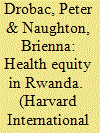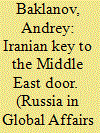|
|
|
Sort Order |
|
|
|
Items / Page
|
|
|
|
|
|
|
| Srl | Item |
| 1 |
ID:
132544


|
|
|
|
|
| Publication |
2014.
|
| Summary/Abstract |
This April, Rwanda will commemorate the 20th anniversary of one of the last century's greatest human tragedies, the 1994 genocide that took the lives of one million Tutsis and moderate Hutus in just one hundred days. As the global community turns its attention to Rwanda on this occasion, they will find a country radically different from the Rwanda of the past. The new Rwanda is a stable and increasingly prosperous country, one where life expectancy has doubled since the difficult aftermath of the genocide. The government's commitment to equity has catalyzed rapid and widespread development, largely by creating opportunity for its poorest citizens. Meanwhile, the health sector's pioneering efforts in health care delivery have drawn global attention. With strong leadership, smart partnerships and innovative programs, Rwanda is forging a new pathway for development.
|
|
|
|
|
|
|
|
|
|
|
|
|
|
|
|
| 2 |
ID:
127051


|
|
|
|
|
| Publication |
2013.
|
| Summary/Abstract |
The election of Hassan Rouhani as Iran's president attracted everyone's attention with the inaugural ceremony attended by officials from more than 50 countries. The event gave rise to numerous propositions about a possible progress in the regime and in Tehran's future relations with the rest of the world. The prevailing perception is that the victory of a moderate and pragmatic candidate gives hope for a more fruitful dialogue which may facilitate the solution of numerous persisting problems. There is a good deal of reasoning in the propositions, yet deep-seated stereotype thinking still prevails. The assessments definitely need serious correction if we do not want to miss the opening opportunities - once again. In a situation of rigid Western economic sanctions and complicated relations with practically all of its neighbors, Iran nevertheless is turning into a most important state in a vast geopolitical area that embraces the Middle and Near East, Central and Western Asia. The Iranian aspect is present in practically all international problems that draw global attention, such as nuclear nonproliferation, the Middle East peace process, the legal status of the Caspian Sea, Central Asia, etc. Tehran is an active participant in the dialogue of civilizations and, naturally, remains one of the key players on the hydrocarbon market. To a large extent, Iran's role has been enhanced by the difficulties brought about by the Arab Spring in other major countries in the region, including Egypt - Iran's traditional competitor - which is sinking into the quagmire of internal political confrontation. Prior to the presidential election I happened to visit Iran and talk with some leading politicians and clerics about the situation in the country, their perception of the Iranian nuclear program and other issues that link Iran with other countries in the region and major world powers. Given the role played by the religious factor, it was particularly interesting to hear the opinions of religious leaders when visiting the holy Shi'ite city of Qom.
|
|
|
|
|
|
|
|
|
|
|
|
|
|
|
|
|
|
|
|
|